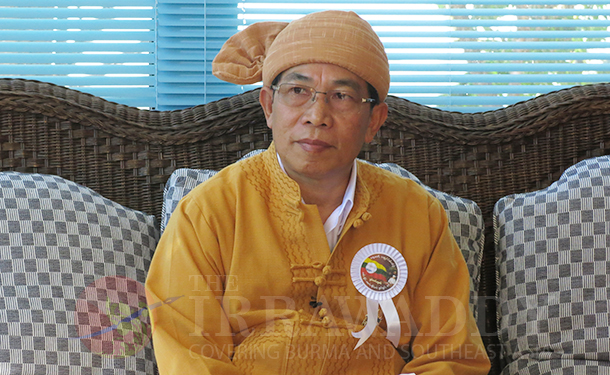LOI TAI LENG, Shan State — Despite recently announcing plans to step down, the chairman of the Restoration Council of Shan State (RCSS) says he will stay on in the role if another leader does not come forward—a situation that sources within the ethnic group say is likely.
At an RCSS annual meeting in January 2013, Lt-Gen Yawd Serk made an official statement that he would not stand in future elections for the leadership of the organization—the political wing of the Shan State Army (SSA) ethnic armed group—in order for other capable persons to come forward.
“We practice democratic means in our organization and hold elections for the RCSS leadership once every four years,” the RCSS chairman told The Irrawaddy in a recent exclusive interview. “A door is open this year, so participants can elect a new chairman among other RCSS leaders. If they can’t choose anyone else and offer this position to me again, I will have no other option but to accept it.”
The election for the head of RCSS, who also acts as the commander-in-chief of the SSA, will be held in Loi Tai Leng, the group’s headquarters near the Burmese-Thai border, on Feb. 13-14. Representatives from different townships in Shan State and SSA leaders have already arrived in Loi Tai Leng—where Shan State National Day celebrations also took place last week—to participate in the event.
Some senior RCSS leaders will reportedly be in the list for the chairmanship election, but a number of SSA officers told The Irrawaddy that Lt-Gen Yawd Serk would remain in his position.
“Even though he [Lt-Gen Yawd Serk] wants another person to replace him because he has led the organization continuously, it is likely that he will be elected again under the current political situation and due to his influence on the RCSS/SSA,” said a commander in Loi Tai Leng, who asked to remain anonymous.
The government and Burma’s ethnic armed groups, including the RCSS/SSA, are in discussions over a nationwide ceasefire agreement. The next round of talks, set to be held in the Karen State capital of Hpa-an, has been repeatedly delayed.
Lt-Gen Yawd Serk, however, stressed that it would be down to the votes of the participants to elect the RCSS chairman for the next term. The RCSS/SSA’s current position in Burma’s peace process and its peace talks with the government will also rely on its new chief, he said.
“I can’t predict or say exactly about the RCSS’s peace-related positions in the future because, if we have a new chairman, decisions will be made by that person.”
Under the leadership of Lt-Gen Yawd Serk, the RCSS/SSA has signed a ceasefire agreement with the government at both regional and national levels. The parties have also agreed on certain future plans.
Since the RCSS was founded by the SSA to act as its political wing with 11 Central Executive Committee members, Lt-Gen Yawd Serk—who was the founding leader of the SSA in 1996—has taken the chairmanship position for three successive terms.

















